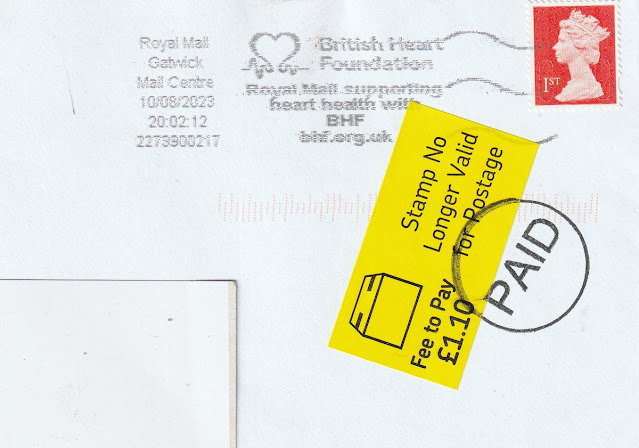UK readers will be familiar with recent 'uproar' in the popular press (and on the much-watched GBNews) about Royal Mail surcharging recipients of letters £5 declaring that the stamps are counterfeit.
It seems that some writers whose stamps have been surcharged on arrival to the addressee are alleging that the stamps they used came from the Royal Mail Swap Out scheme.
Certainly with the number of forged stamps that we and others have reported there have certainly been plenty sold to unsuspecting customers who would - understandably - like to spend less than the £1.25/75p that the stamps cost until today.
 |
| Genuine, left, and forged 1st class datamatrix Machin definitive stamp. |
It is understandable that Royal Mail would want to surcharge invalidated stamps - plenty of notice has been given after all.
 |
| Pre-barcode, possibly counterfeit, 1st class stamp used after invalidation. |
But where were Revenue Protection when this letter was posted to Canada (and cancelled there on arrival)?
In terms of total value, the correct postage is paid - £2.20. But only 10p went to Royal Mail, the rest went to the Tristan da Cunha Post Office. And not only were the stamps not cancelled at the mail centre, but nobody noticed that they were not British.
No monarch's head (the cypher instead) is a big clue - but apart from that and the name of the country, they could easily have been issued by Royal Mail. Very many of our wildlife stamps have been photographic.
 |
| 'Sea Life of the British Coast' issue 2007. |
But it comes as no consolation to those who have been surcharged for stamps wrongly identified as 'counterfeit' that sometimes invalid stamps are let through without any action.
It seems that nothing has changed since we first reported an occurrence of this type four years ago, with stamps from St Helena, Jersey and the Falklands being cancelled at the post office counter, and Isle of Man stamps being cancelled at Peterborough Mail Centre.
UPDATE 3 April 2024
According to a report in the Daily Telegraph
"Royal Mail is investigating problems with new barcoded stamps amid fears customers are wrongly being fined to receive letters.
"Postmasters have said that the allegedly fake stamps were bought from Royal Mail directly, prompting fears that they are wrongly being identified as counterfeit.
Following a meeting on Tuesday between the Post Office minister Kevin Hollinrake and Royal Mail chief executive Martin Seidenberg, the postal service committed to investigating the issue.
The Telegraph understands that a formal investigation has not been launched, but that Royal Mail has assured the minister it is working with retailers including the Post Office to identify the “source of the problem”.
Mr Hollinrake said: “We spoke to Royal Mail and they are investigating and they are working alongside the Post Office and other retailers to try and ascertain the source of the problem.”
Last week, Royal Mail insisted its processes are “secure” and that it uses “specialist equipment” to assess whether a stamp is genuine. Most stamps are verified using the service’s scanning devices at sorting offices nationwide.
The Post Office said any allegation that fake stamps were bought at one of its branches was “extremely serious” as it implied that a postmaster or member of staff had swapped genuine Royal Mail stamps with counterfeits."

















So far this week I've received six stamped cards and letters. On none of them have the stamps been cancelled, not even with a pen!
ReplyDeleteThis surely proves, firstly, how skilled the counterfeiters are and, secondly, that the costly introduction of barcoded stamps hasn't worked.
ReplyDeleteThat final comment from the Post Office is disgraceful - once again jumping to the conclusion that if something is not right, corrupt postmasters must be to blame. You would think their comments would be a bit more cautious by now!!!
ReplyDeleteAn article about this has recently appeared on the BBC website: https://www.bbc.co.uk/news/business-68786782
ReplyDeleteIf counterfeit stamps were made with copies of genuine barcodes, or with randomly generated but correctly formatted barcodes, presumably that would invalidate the genuine stamp with the matching barcode, if the forgery was used first. (Assuming that the codes are stored in a database as “invalid” once they have been seen on an item of mail.)
ReplyDeleteIs this a plausible cause for genuine stamps being flagged as invalid?